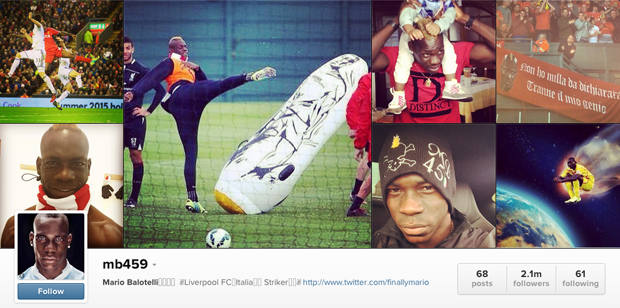Padraig Reidy: In defence of Mario Balotelli

(Image: instagram.com/mb459)
I feel sorry for Mario Balotelli. I’m sure he’ll take that as a comfort; knowing he’s not the only one asking “why always Mario?” That is not to say I think he’s drifted through life blameless and immaculate: not at all. I’ve only seen him in the flesh once, when Manchester City played Arsenal. He had a terrible game and got sent off for what even I, sitting in row Z at the other end of the ground, could see was a stupid and dangerous tackle.
But I’ve had a soft spot for Balotelli ever since someone pointed out he looks like a baby dinosaur. Without wishing to infantilise him, he’s like the boy in school who can’t help getting in trouble even when he’s trying to be good. Ballotelli’s current situation is the perfect example. Last week, the player posted an image on Instagram, showing Nintendo character Super Mario (from whom the footballer takes his nickname, or at least would like to).
“Don’t be racist!”, it read (Yay!)
“Be like Mario” (LOL!)
“He’s an Italian plumber” (indeed he is)
“created by Japanese people” (correct)
“who speaks English” (sort of)
“and looks like a Mexican” (I suppose he does. A bit.)
“…jumps like a black man” (hmmm)
“and grabs coins like a Jew” (oh)
Long story short: people suggested that this might be a bit racist towards black and Jewish people, Balotelli responded that his mum is Jewish. Eventually, he took the post down and apologised. But by then it was too late. The Football Association announced over the weekend that the striker would face an investigation for using insulting and improper language with “reference to ethnic origin and/or colour and/or race and/or nationality and/or religion or belief”.
For what it’s worth, I don’t believe for a moment that Balotelli meant to insult anyone with his Instagram post. I think he entirely sincerely posted the meme seeing it as an anti-racist message. The problem for poor Mario was that his ill-judged but innocent Instagram came while the football world was actually paying attention to anti-semitism, as Wigan chairman Dave Whelan spouted a series of inappropriate race-related comments (Jews, money, you know, that stuff) after hiring former Cardiff manager Malky Mackay, who himself had run into controversy over dubious texts (Jews, money, on and on it goes).
Whelan stylishly compounded the issue with a “clarifying” interview in the Jewish Telegraph, where he spun the ”some of my best friends are…” line, saying there must be “a dozen” Jews with apartments near his residence in Majorca, and “so many Jewish people go to Barbados at Christmas. That’s when I go. I see a lot of them in the Lone Star, in restaurants. I play golf with a few of them.”
In the same interview, Whelan told how when he was younger, people called the only Chinese restaurant in Wigan “the Chingalings”, and absolutely nobody had minded (though one doubts anyone asked the Chinese people of Wigan).
Whelan now also faces charges of misconduct from the FA. I’m not about to suggest that the FA has no right to investigate Whelan, or anyone involved in professional football in England. Associations can have their own rules and standards. But it would be sad if, in football’s newfound determination to deal with discrimination, innocents such as Balotelli got caught in the dragnet.
The interesting question is whether, in combating racism, one confronts the words used, the stereotypes invoked, the intent behind them, or all three at once. Is it possible to disentangle the three?
Nowhere is this more clearly illustrated than the debate about whether Tottenham Hotspur fans should be able to chant “yids” or not. Short explanation: some Spurs fans are Jewish, many identify as the “yid army”. Some people — mostly not Spurs fans — feel that Spurs fans chanting “yids” legitimises anti-semitic chanting by fans of other teams. Spurs fans say it’s their chant and their word and they are using it positively. Unpick that one, sports fans.
Words in and of themselves are neutral entities. Does saying the word “yid” — in and of itself — make me more or less anti-semitic? No. But the creation of a taboo can elevate a word, bringing a certain thrill to its use. In a society where, more or less, we have decided bigotry is a bad thing (which is not to suggest a society where bigotry is no longer a problem), the use of words and phrases associated with bigotry can take on a thrill of its own, as much for the well intentioned as for the malevolent. The bad taste joke, the inappropriate interjection, the drunken football chant using the words you might not be supposed to use, are the shared cigarette behind the school bike shed; the shared, line-crossing moments that so often bond people.
The joy for most Unilad Bantalopes lies in that shared bond. For the person who created the meme which ill-feted Mario Balotelli shared (very much from the Bantasauraus school), one could simultaneously attempt to be anti-racist and use racial stereotypes. Human beings are complicated like that. And that’s why a zero-tolerance approach to words and meanings is unlikely to work on us.
This article was posted on 11 December 2014 at indexoncensorship
